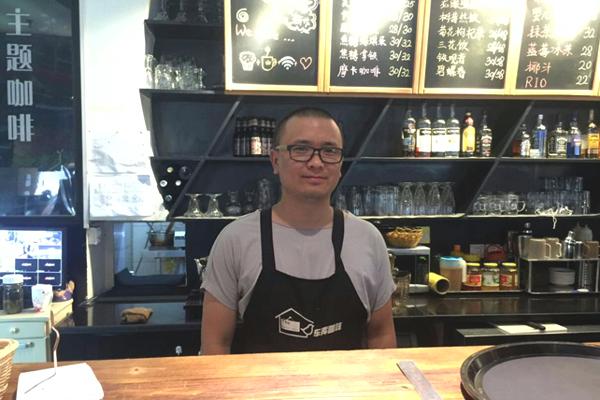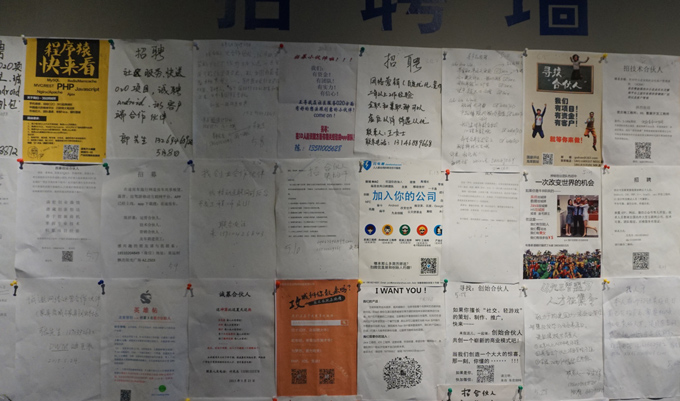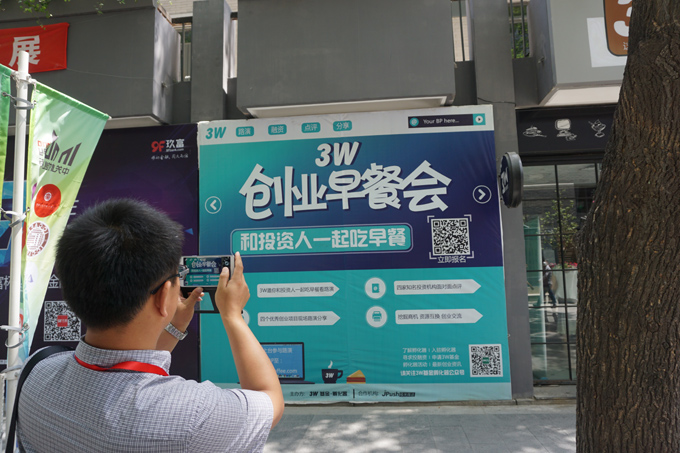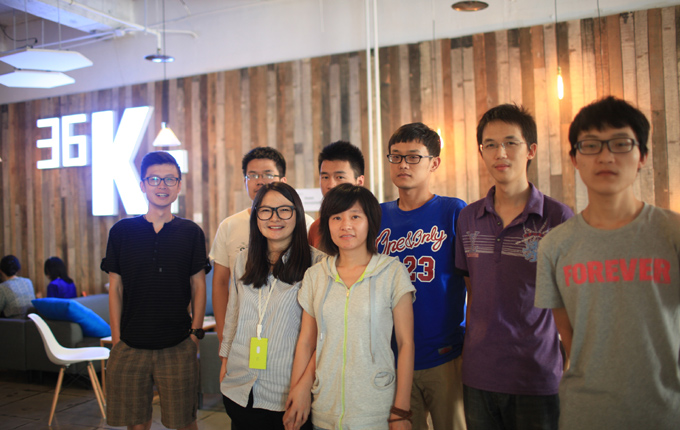
Shen Mengmin serves at Cheku Cafe on Wednesday, while its waiters and workers were out for a trip. Having been immersed at Cheku for two years, he has become friends with the staff. [Photo/Provided to chinadaily.com.cn]
Shen Mengmin, 33, a former excavator salesman from Central China’s Henan province, came to Beijing in 2013 hoping to create an app that links second-hand excavators with buyers online. He turned to Garage Cafe, or “Cheku Cafe” in Chinese, one of the most active incubators for grassroot innovators in the capital, located on the second floor of a hotel at Zhongguancun Innovation Street in Beijing.
“I stepped into Cheku without knowing anything about developing an app,” he said. For 18 months he immersed himself there brainstorming with others. During tough times he slept in public bath for 38 yuan ($6) a night to save money.
Later, he received a 1.5 million yuan investment, and found a programmer who made his dream product come true. The app has already been downloaded 30,000 times on Android market and the programmer is now a core member of his team.
Shen is not alone. Thousands of individual innovators who have no resources to create a product or start their own business are achieving their goals and turning themselves into formidable innovators, thanks to bustling makerspaces like Cheku cafe.

A wall at Cheku’s entrance is covered with notices seeking partners and investors. “Ninety percent of investments made here involve social capital,” said Liu Hui, Cheku’s co-founder, June 3, 2015.[Photo by Ma Danning/chinadaily.com.cn]
“Cheku is bringing in ordinary people without formal education, technology or money, and empowering them to do something that they want to do. This is especially important in a country where the innovation is largely confined to big companies, or elites,” said Li Yan, a Cheku manager.
The cafe was founded in 2011 by Su Di, an investor who was having a hard time finding suitable start-ups to invest in. The cafe’s name is drawn from US companies such as Amazon and Google who got their start in garages.
It is open to everyone, and after buying a single cup of coffee customers can spend a whole day there, with electrical outlets, Wi-Fi connection, and basic office equipment, including printers and copiers, provided free. Humming with activity, IT moguls, successful entrepreneurs and investors are invited to share their ideas here.
Assistance in company registration, bank loans, inexpensive online services, such as cloud storage and patent information are also provided by Cheku managers. But most Cheku-ers say they love the place because it attracts a circle of like-minded people who can help pool resources.

In the past year, over 20 agencies providing services for startups have been established along the Zhongguancun Innovation Street, Beijing, March 17.[Photo by Ma Danning/chinadaily.com.cn]
Makerspaces, or hackerplaces, have been part of the global entrepreneurship scene for a while. They can be traced to Berlin where, in 1995, a group of young programmers pooled ideas and began sharing a workshop space. Over the past four years, the movement has gained ground in China, too, with philanthropic entrepreneurs or companies eyeing the startup market establishing spaces to help startups.
There are at least 130 makerspaces in China clustered in Beijing, Shenzhen and Shanghai but also in a wide swath of second tier, inland cities.
As one of the earliest and most successful makerspaces in Beijing, Cheku’s business model has been copied in other cities. Nanjing-based 321 Chuangzhi Cafe, Beehive Cafe in Dongguan, South China’s Guangdong are all of this type with a focus on forming an open community.
“Cheku is where you find your partner,” said co-founder Liu Hui. “It’s like forming a band. You have a singer, a drummer and need a guitarist. This is where you find one. “
Ren Xiaoqian, a designer, and programmer Huang Guangming, started working at Cheku when it was first established. It was there that they met their future investor, founder and president of Zendai Group, who also offered business advice. They finally came up with a new type of mobile Internet product called MomentCam, which allows users to easily create and share customized, animated caricatures of people.

A screen grab from the MomentCam’s official website. The app allows users to create customized cartoons and GIF.[Photo/chinadaily.com.cn]
MomentCam might be one of the most successful products generated in Cheku. The app has been downloaded more than 200 million times globally and was crowned by Facebook as winner of its FB Start competition, a contest that sought to identify the best apps in the world.
A large number of people working in Cheku are technicians from traditional manufacturing industries who are transforming traditional wares into smart ones. Some target the niche market of smart home devices, with a competitive edge in projects too small to appeal to big tech companies.
Hu Liangcai, an electromechanical professional for 12 years from East China’s Jiangxi province, came to Cheku last year with a plan to make a water-filled heater that can be connected to Wi-Fi and operated by mobile phone via an app. Although knowing nothing about how to connect his heaters to the Internet, Hu met some computer engineers and tech fans who helped him select multi-chip modules and create the app.
The cafe put Hu in touch with many free services, including the Smart Cloud, cloud computing support from JD, one of China’s top brands and largest e-tailer. The service usually costs individual users 50,000 yuan a year.
Naturally, at the other end of the spectrum, Internet specialists are also grabbing a slice of the start-up pie through more exclusive incubators. Most of these more “elite” innovators are middle- or high-level employees at China’s leading Internet firms who have quit their jobs to try their luck in their own ventures.
Such innovators are seen as technology experts, and can attract a powerful team from within their networks. What they lack are capital and knowledge of starting a company, and this is where a different kind of makerspace comes in.
3W Coffee in Beijing, which Premier Li Keqiang visited in May in a gesture of government support for startups, and Innovation Works by Kai-Fu Lee, the founding president of Google China and Binggo Café are examples of investment-oriented, professional incubators.

A visitor scans the code of a 3W Coffee activity inviting investors to meet start-up businesses. After Premier Li Keqiang visited 3W Cafe last month the cafe has turned into a tourism site. [Photo by Ma Danning/chinadaily.com.cn]
Beijing-based Space 36Kr incubator labels itself as the place to get much-needed startup financing. 36Kr was established in 2011 as a media firm focused on financial news. In April 2014, it opened Space 36Kr incubator.
36Kr has a strict screening system. A panel of five to seven professional investors and IT business insiders choose 10-30 teams to incubate, usually from 1,000 applicants. Once selected, teams can work for free for three months and get entrepreneurship training. At the end of the incubation period, which they call “graduation”, a meeting is arranged with top Chinese investors, including IDG, Sequoia Capital China and Matrix Partners China.
Out of the 42 teams to have “graduated”, 40 have received seed funding, 300 million yuan in total, or 7.5 million per team. Six got two rounds of investments. Among the two that did not secure investment, one was acquired while the other achieved self-financing.
“More than half of the 42 projects are launched by people who have quit big companies such as Alibaba, Tencent Holdings Ltd., Baidu Inc., Facebook and Google,”said Zheng Wangyu, a Space 36Kr manager and member of the “screening” team.

The twelve teams incubated at Space 36Kr between May and August last year celebrate their “graduation”. Eleven teams secured their first investment at Space 36Kr, totaling 50 million yuan. [Photo/Provided to chinadaily.com.cn]
Liu Junyan, or Jervis Liu, founder of Easemob, graduated last August, before receiving two rounds of investments amounting to nearly $7 million. The core members of his team, including himself, are four senior engineers who resigned from Nokia, Polycom and Redhat, the world’s leading provider of open source solutions.
They designed a tool that adds instant messaging to apps and enables apps to have built-in customer service. It was hailed by app developers who said that with it they can easily make apps social without programming a social networking function from scratch. A year after it was launched, 23,000 companies have used the tool in various kinds of apps, ranging from telecommunications, e-commerce, to financing.
“According to our information, this is the first product of its type in the world,” said Tang Huan, public relations chief of Easymob.
Zhang Mo, a programmer who once worked with Microsoft Research and IBM, graduated from 36Kr too. She designed dress-plus.com, a website that uses advanced image recognition and deep-learning techniques. Users can take a picture of a dress or upload an image, and the website finds similar dresses from a growing database covering more than 150 online marketplace, including Amazon, Tmall, Farfetch and Heels.
“Being professional, the elites are more likely to survive fierce competition, and build something that has huge impact,” said Zheng.

Some leaders of the 12 teams incubated at Space 36Kr between May and August last year. Eleven teams secured their first investment at Space 36Kr, totaling 50 million yuan. [Photo/Provided to chinadaily.com.cn]
On March, 36Kr launched an online platform that connects startup companies and angel investors across the country. So far, more than 300 qualified investors and 22,000 startup companies have subscribed and 50 investments totaling 200 million yuan have been made.
Now, 36kr is planning to raise capital in new ways to fuel burgeoning IT innovation. Its new online equity crowd funding platform Next allows people with either 300,000 yuan annual salary or one million yuan in financial deposits, to invest in start-up companies.
“Some fast-expanding startups offer original shares, which effectively ensure low risk and high return to buyers. The platform is where ideas meet capital, and crowd funding for business starters is the trend, “ said Liu Chengcheng, 36Kr CEO.
